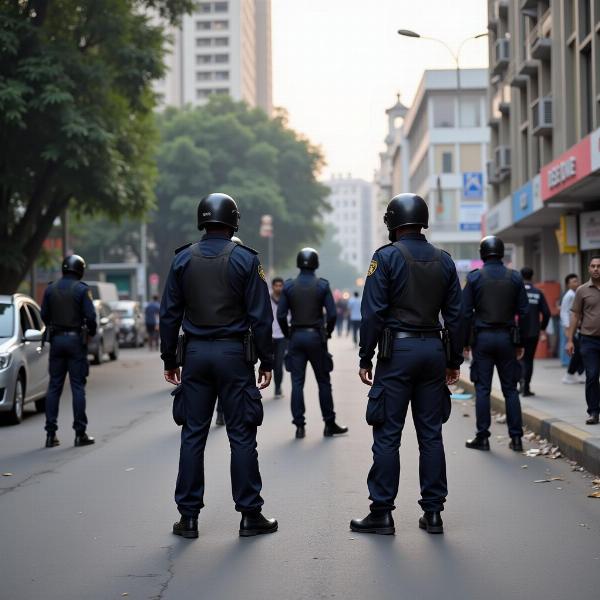Understanding the meaning of “sentries” in Hindi is crucial for accurate translation and communication. This guide explores the various Hindi equivalents of “sentries,” delving into their nuances and contextual usage. We’ll also examine the cultural significance of sentries in India, from ancient traditions to modern-day practices.
Understanding “Sentries” in a Hindi Context
The English word “sentry” refers to a guard, particularly a soldier, stationed to keep watch and prevent unauthorized passage. In Hindi, several words convey this meaning, each with its own subtle connotations. Choosing the right word depends heavily on the specific context.
Common Hindi Translations for “Sentry”
- प्रहरी (prahari): This is perhaps the most common and direct translation of “sentry.” It denotes a guard, watchman, or sentinel. It can be used in both military and civilian contexts.
- चौकीदार (chowkidar): This term refers to a watchman or guard, often employed in residential or commercial settings. While it can be used for a sentry, it often implies a less formal or less militaristic role.
- पहरा (pahara): This word refers to the act of guarding or keeping watch. It can also denote the place where a sentry stands guard.
- रक्षक (rakshak): This term means protector or guardian. While it can be used for a sentry, it has a broader meaning and can refer to anyone who protects something or someone.
- संरक्षक (sanrakshak): Similar to “rakshak,” this word means protector or guardian. It often implies a higher level of responsibility or authority.
Choosing the Right Hindi Word
The specific context determines the most appropriate Hindi translation for “sentry.” For military contexts, “prahari” is often the best choice. For civilian settings, “chowkidar” might be more suitable. Consider these examples:
- Military Context: “The sentries guarded the border.” (प्रहरी सीमा की रक्षा कर रहे थे – Prahari seema ki raksha kar rahe the.)
- Civilian Context: “The sentry stopped the trespasser.” (चौकीदार ने अतिक्रमणकारी को रोका – Chowkidar ne atikramankari ko roka.)
Nuances and Connotations
Understanding the subtle differences between these Hindi words is essential for accurate translation. “Prahari” carries a strong sense of duty and vigilance, while “chowkidar” implies a more routine guarding role. “Rakshak” and “sanrakshak” have a broader meaning and can refer to any protector, not just a designated guard.
Sentries in Indian Culture and History
Sentries have played a significant role in Indian history and culture. From ancient forts and palaces to modern-day military installations, guards have been essential for maintaining security and order.
Ancient Traditions
Historically, sentries were crucial for protecting kingdoms and empires. They stood guard at strategic locations, preventing enemy incursions and maintaining internal order.
Modern Practices
Today, sentries continue to play a vital role in India’s security apparatus. They guard military installations, government buildings, and other important sites.
How do you say “Standing Sentry” in Hindi?
“Standing sentry” can be translated as “पहरे पर खड़ा होना” (pahre par khada hona) or “प्रहरी ड्यूटी पर” (prahari duty par).
What is the difference between “Prahari” and “Chowkidar”?
While both mean “guard,” “prahari” often refers to a military or official guard, whereas “chowkidar” generally denotes a watchman in a civilian setting.
 Modern Security Sentries
Modern Security Sentries
Conclusion
Understanding the meaning of “sentries” in Hindi requires considering the various nuances and contextual applications. Choosing the correct Hindi word, whether “prahari,” “chowkidar,” or another equivalent, ensures accurate communication and reflects the rich cultural context of this important concept. By understanding the subtleties of these terms, you can gain a deeper appreciation for the role of sentries in Indian culture and history.
FAQ
- What is the most common Hindi word for “sentry”? A: प्रहरी (prahari) is the most common and direct translation.
- What is the difference between पहरा (pahara) and प्रहरी (prahari)? A: पहरा (pahara) refers to the act of guarding, while प्रहरी (prahari) refers to the person doing the guarding.
- Can चौकीदार (chowkidar) be used for a military sentry? A: While possible, it is less common and implies a less formal role.
- How do you say “sentry duty” in Hindi? A: प्रहरी ड्यूटी (prahari duty) is the common translation.
- What are some other words related to “sentry” in Hindi? A: रक्षक (rakshak) and संरक्षक (sanrakshak) are related terms meaning protector or guardian.
- What is the cultural significance of sentries in India? A: Sentries have historically played a vital role in protecting kingdoms, and they continue to be important for national security today.
- Where can I find more information about Hindi translations? A: Meaning-Hindi.in offers professional translation services for a variety of needs.
Meaning-Hindi.in is your trusted partner for accurate and culturally sensitive Hindi translations. We offer a wide range of translation services, specializing in business, legal, technical, website, educational, and specialized translations. Our expert linguists ensure quality and precision in every project. Contact us today for a free quote! Email: [email protected], Phone: +91 11-4502-7584. Meaning-Hindi.in provides high-quality Hindi translation services for all your needs.